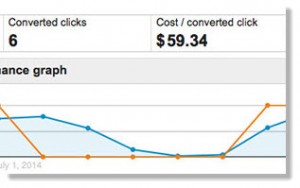In this article we look at why podcasts should play an integral role in your content marketing strategy, plus a 10-step guide to nailing your podcast SEO.
Demand for podcast content is growing every year with a noticeable peak in the UK coinciding with our first lockdown during the months of April and May last year. Despite a dip in searches after lockdown easing, listening figures are still up year-on-year and this is clearly a content marketing trend that’s here to stick around.
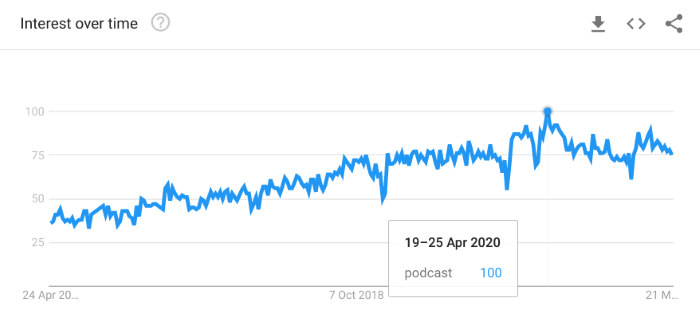
Rise of podcasts in content marketing
The rise of podcasts has been steady for more than a decade but it’s only in the past few years where the content format has hit the big time. Now, the likes of Apple and Spotify are going all-in on podcasts, signing exclusive deals with major figures – such as the multimillion partnership with Harry and Meghan on Spotify.
According to the Statista Research Department, more than 15 million people in the UK were listening to podcasts in 2020 with the figure expected to approach 20 million by 2024.
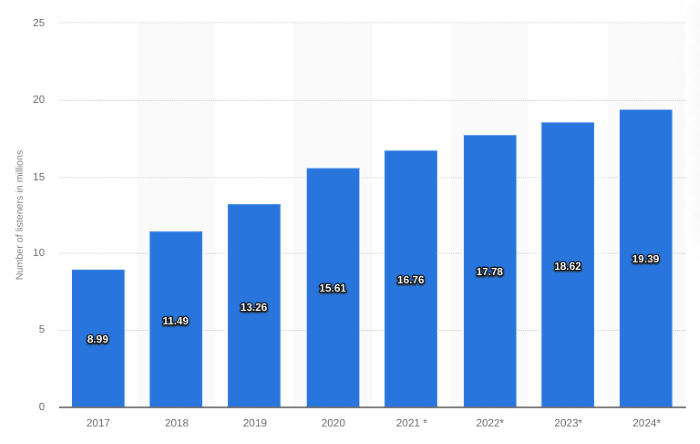
Podcasts are seeing steady year-on-year growth in the UK and there’s plenty of room for wider adoption with 21% of the country tuning in (or logging in) to listen, based on data from Reuters Institute. That makes people in the UK the 11th keenest podcast listeners in the world (joint with Germany) while Ireland is third (39%) and the United States fifth (35%), representing a vast English speaking audience with Canada and Australia also in the top 10.
According to research by Ofcom, people in the UK are listening to more podcasts since the first lockdown last year. Adoption is strongest among the 16-34 age bracket with 20% of all respondents listening to podcast content within the previous week.
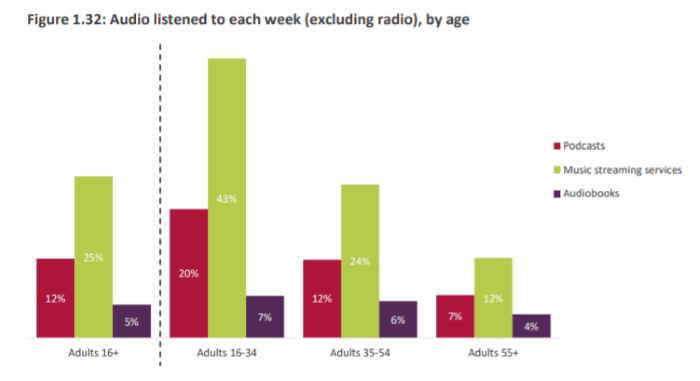
Why should marketers care about podcasts?
Podcasts might be gaining popularity but why should brands and marketers care about this content format – and what makes it different from radio or other audio channels? Well, the key lies in podcast audiences, which are more engaged and loyal than radio listeners and traditional audio audiences. While few people sit down to listen to an entire radio show, completion rates for podcasts can be as high as 88%-90%, largely thanks to an episode format that can be as concise or in-depth as audiences demand.
The episode format also builds up anticipation for the next show and 79% of podcasts listeners tune in to a new episode as soon as it’s released.
Podcast audiences tend to be loyal, too. If you engage with your listeners on social media, include them in the shows by taking calls and build a community spirit, then you’re going to develop a loyal audience and a lot of publishers end up with genuine fan bases.
Studies have also found that typical podcast listeners are young, educated and affluent – key demographic features for marketers and brands across all industries.
Moving away from the audiences themselves, It’s also important to understand the intrinsic benefits of audio content:
- Audiences can listen while they do other things (drive, commute, work out, clean or anything hands-free)
- Listening is less intense than reading, which is great for technical or complex topics
- Human voices are more engaging than text
- Podcasts are mobile-friendly – no matter how long they are
- Podcasts rank in Google Search
- Easy to make podcasts interactive
- Easy to monetise content with subscriptions
- Audio content is relatively affordable to produce
- Less competition vs traditional channels
Competition is an interesting topic because podcasts are certainly less competitive than, say, blog content but their growing popularity will gradually reduce this over time. So, if this is a channel you’re looking to exploit, now is the time to move so that you can build a loyal audience and make it harder for newcomers to steal these listeners from you in the future.
So how can you optimise podcast content for SEO and build this audience in the first place?
10-step guide to podcast SEO
Let’s explore the 10 key steps you need to take to maximise your podcast SEO:
- Podcast keyword research
- Optimise episode pages on your website
- Title optimisation & meta descriptions
- Creating quality podcast content
- Create transcriptions for every episode
- Create internal links for every episode
- Claim your podcast on Google Podcasts Manager
- Repurpose your podcast content
- Choose the right podcast platforms
- Win backlinks for podcast pages
While there’s a heavy emphasis on Google Search, we also explore the other organic opportunities for building an audience of listeners. The obvious challenge is optimising audio content for search platforms that traditionally crawl and index HTML code. But, as you’ll see from these 10 steps, text content still plays a key role in podcast SEO and Google is more capable of understanding audio content than you might think.
#1: Podcast keyword research
Since 2019, Google shows podcast content in the organic SERPs so people searching for things like “business podcasts” may see something like this on the results page:
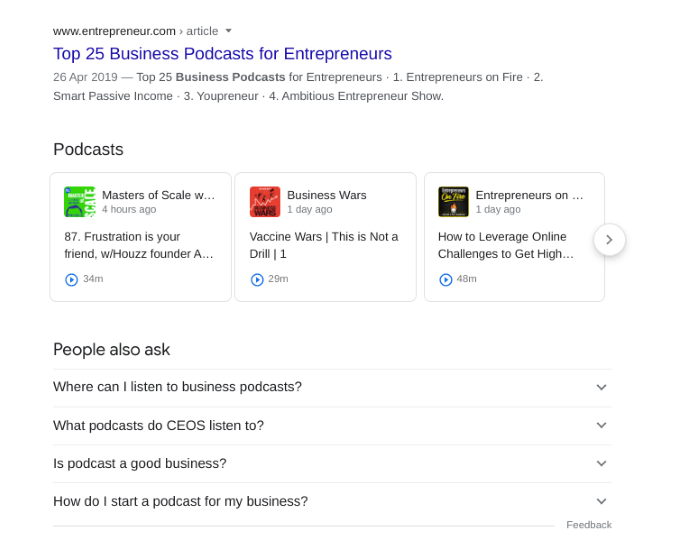
This has opened up a wealth of new keyword opportunities for podcast publishers and turned Google Search into a podcast discovery platform. Topping the list of target keywords in your podcast SEO strategy are variations of “[the subject you cover] podcasts” with the aim of showing at the top of the results page. In fact, the only keyword more important than these in Google Search is your brand/podcast publishing name.
As things stand, most queries that show podcast results in Google Search include the phrase “podcast” itself. So you’re not going to find a new keyword like “how to start a business after Covid-19” and suddenly get featured in a Podcasts feed like above. However, you should host every episode on a dedicated page of your website, which can rank for these keywords like any other page.
#2: Optimise episode pages on your website
For most keywords, web pages are still the best way to rank in Google Search and every podcast episode should have its own dedicated page on your site. This allows you to target keywords with every episode, optimise each episode for search and maximise search coverage. For example, when someone types “data science podcasts” into Google, they’ll see this podcasts feed in Google:
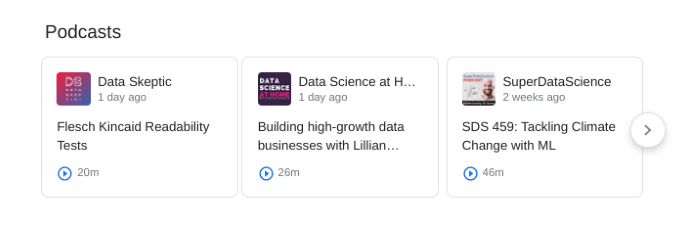
Meanwhile, listeners who already know and enjoy the Data Science at Home podcast will see the following if they type in the brand keyword “Data Science at Home”:

So the Podcasts feed is great when people are looking for new podcasts or already know your brand but it only provides limited search coverage. When this publisher wants to target a keyword like “building high-growth data businesses,” they need to optimise a web page to rank in the classic blue links.

In this sense, you should treat the web page like any other on your website and optimise it, based on the same rules. As with any other web page, you want a good 300+ words of unique content so, at the very least, add a text summary of the podcast embedded on your page. Better yet, you could create a blog post summary covering all of the key points, which improves the quality of the page content and provides a text alternative for visitors who prefer to read.
#3: Title optimisation & meta descriptions
Podcast pages on your website should include the same title as the podcast episode and you should aim for consistency across every platform your episodes are uploaded on (Spotify, YouTube Google Podcasts, etc.)
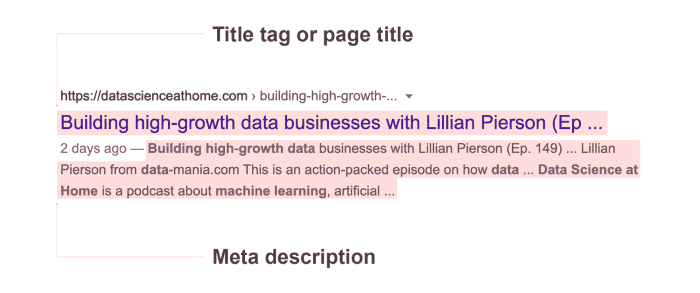
Ideally, your target keyword should be the first phrase in your title and it’s good practice to include the episode number, too. Your meta description is there to tell users what your podcast is about and encourage them to click through. Be honest and accurate while trying to differentiate from any other results covering similar topics.
#4: Creating quality podcast content
Back in April 2018, Google hinted at a future where its algorithms can understand speech in podcasts, automatically transcribe them and rank podcasts based on the content and quality of the material. By May 2019, Google Podcasts was already transcribing episodes to improve its search results.
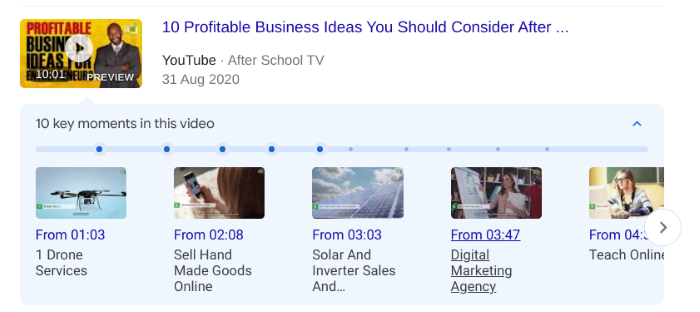
This is the same technology Google already uses to transcribe YouTube footage and pick the key moments in a video, which means Google is quite capable of gauging the relevance and quality of your podcasts but you can give it a helping hand by optimising for its algorithm.
Much like text content, having a clear structure in your podcasts benefits your audience and Google. You also want to use relevant keywords appropriately throughout your audio without overusing or forcing them into your content (keyword stuffing applies here, too).
#5: Provide transcriptions for every episode
Even if Google is capable of transcribing podcast content, you should take the time to provide verified transcriptions for each episode. Google’s transcription technology isn’t flawless and it can run into problems with conversations (multiple speakers), accents, fast speakers, background noises and plenty of other issues.
By providing transcripts, you give search engines a crawlable copy of your content to leave no room for errors. You’re also providing a text copy users can access if they want to read, browse or quote something from your podcast – so there are usability benefits to consider, too.
#6: Create internal links for every episode
As with any new page on your website, you should look at your existing pages and content to analyse where you can build internal links. Basically, every page on your site that’s relevant to your new episode topic should link to the relevant podcast page. Likewise, you should link out from episode pages to other internal pages on your site, especially other episodes that are relevant. For example, you might run a series of episodes on the same topic or regularly publish episodes on the same set of topics or categories.
At the very least, you can link to the previous and next episodes chronologically, which automatically builds internal links for every episode page and adds navigational value to the user experience.
#7: Claim your podcast on Google Podcasts Manager
Google Search isn’t the only organic platform to gain visibility and build your audience. Many of the biggest names in tech are investing big in podcasts and Google joins the likes of Apple and Spotify with its own dedicated platform: Google Podcasts. The Podcasts feed in Google Search pulls the data from this platform to show podcast listings in the SERPs.
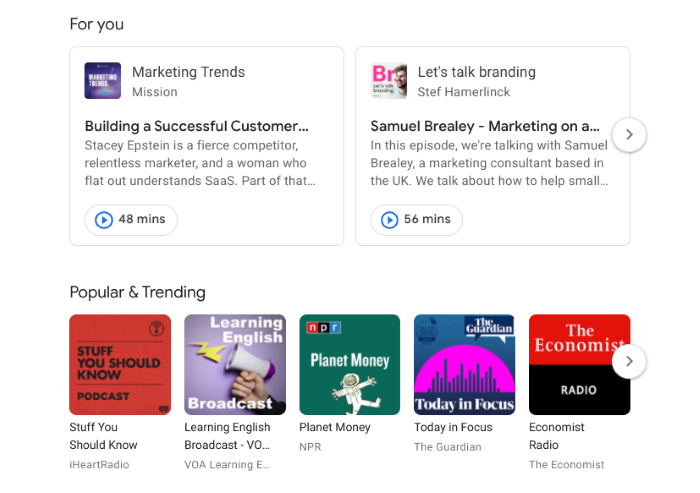
With an estimated 50+ million regular users and more than 100 million downloads (and growing), Google Podcasts is building a key platform in this space.
To get your content listed on the app, you need to claim your podcast in Google Podcasts Manager. All you need to do is click the Start now button on the homepage, type in your podcast RSS feed URL and follow the verification steps. It only takes a couple of minutes and, once you’re done, Google will index your feed so users can discover it across Google Home, Google Search, Google Assistant and, of course, Google Podcasts.

#8: Repurpose your podcast content
Another production benefit of podcasts is that you’re almost obliged to repurpose your content, especially into text format for situations where users can’t (or don’t want to) listen to episodes in full. There are a lot of reasons to do this:
- Content ideas go further
- You get more out of every episode’s production budget
- You can build more internal links
- Multimedia content caters for different preferences
- Multimedia content gives you more coverage
- Repurposed content promotes your podcast episodes – often on channels not suited to podcasts
- Text content is easier to optimise for SEO
A great way to maximise content output from every podcast episode is to record video podcast episodes, which opens up channels like YouTube, the Videos feed in Google Ads and social media platforms where video content typically achieves the highest engagement. Video is perfect for cutting up into clips, highlights, teasers and short, engaging posts for social media campaigns.
Alongside this, you can repurpose your episodes into blog posts, in-depth guides and content series to provide comprehensive coverage of the topics that matter most to your audience. Again, you can create short, snappy posts to introduce topics on social media and guide visitors to more in-depth information with every click (yet more internal links).
#9: Choose the right podcast platforms
Google Podcasts isn’t the only big player in town with Apple Podcasts providing another dedicated app and Spotify aiming to be the only app people use for music and podcast listening. Also check out tools like Podfollow which allows you to create a dynamic link that enables listeners to hear the podcast on whatever platform they use, and gives you great data insights too!

There are plenty of other platforms, too, as competition heats up in the audio space and you need to decide where you’re going to host your content.
If you’re producing video podcast episodes, then YouTube is an essential channel and a great place to build a unique audience. You may also explore platforms like Patreon if you want to paywall certain episodes although YouTube has introduced some excellent subscription features in recent years, such as tiered plans for access to different types of content and rewards.
#10: Win backlinks for podcast pages
Backlinks are just as important for podcast SEO as any other organic search strategy and, once again, it’s the podcast pages on your website that need to win these links. Structurally speaking, you want a podcast homepage (even if it’s a subdomain or subdirectory) to act as the domain of your podcast strategy.
Next, you need to think about earning backlinks for individual episode pages. Once you’ve got the right structure in place, here are some tips to earn quality backlinks:
- Get expert guests on your podcasts to increase authority, win listeners from other audiences and give a wider pool of people reason to link to your episode (starting with the guest themselves).
- Appear as guests on other podcasts as this generally wins a link back to your own podcast domain.
- Be newsworthy by covering the latest developments in your niche, which relevant sites are likely to talk about and link to.
- Offer unique insights that aren’t available elsewhere so that your episode stands out as the resource to link to.
- Promote your podcast to leading sites in your niche to make sure they’re aware of your content and give them reason to talk about it – eg: ask them to review it in a blog post.
- Reference other content producers in your episodes for stats, perspectives, etc. to grab their attention and give them reason to talk about you, too.
- Engage with other podcasts to create back-and-forths (maybe even a little friendly beef) to get people talking and stoke up loyalty among respective audiences.
Essentially, the same rules apply but podcasts lend themselves surprisingly well to link building, thanks to the natural format of featuring guests in episodes. Once you’ve built a bit of momentum, it’s relatively easy to reach out and secure new guests on a regular basis.
When it comes to referencing other content producers and sources in your podcast episodes, make sure you include this in your transcript, repurposed text content and social media posts. This way, they’ll get a few pings from any citation software they’re using and see that you’ve referenced them multiple times.
Podcasts are here to stay
Podcasts have been hyped up as a content marketing trend a few times in the past but it’s the listening numbers and steady growth rates that show audio content is booming and podcasts are here to stay, this time around. Tech giants Google, Apple and Spotify are all betting big on this content format because audiences are engaging with hosts and producers in powerful ways.
Digital & Social Articles on Business 2 Community
(47)
Report Post


